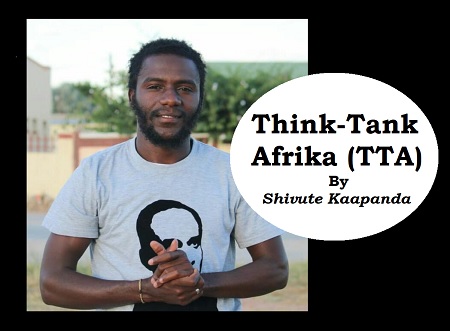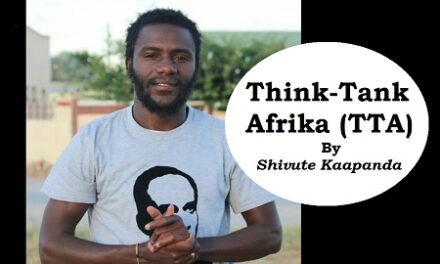Africans eat frogs, so what?
By Shivute Kaapanda [Thing Tank Africa]
Generations of Africans that are Aawambo, including many others, have survived for centuries on consumption of indigenous African cuisines including seasonal meat products; these included frogs, fish, caterpillars, earth worms and other meats from crawly insects.
Plant products consumed included: eenyandi, eendunga, omakwa, eenhapanhapa, eembutu, water lilies (omavo) among many others.
It is thanks to these food products which kept generations alive and healthy because in most cases nature provided it for free and it didn’t have to come at a capitalist price like the modern way by which one may get crayfish and crabs.
In Aawambo traditional human and natural life-of-being, one of the coolest seasonal meat products which were and still are available during rainy seasons are frogs.
Fat and delicious with all nutrients, frogs provide an ultimate delicacy to many homes in northern Namibia after a long season without rain which is often characterized by lack of meat.
When it rains in the north Aawambo people celebrate rain with loud ululations not only because it gives them farming advantages but also because the rain brings with it a season of peace and calmness and good temperatures favorable for many human activities. It also brings free meat which include frogs and fish and many other edible insects and seasonal plant products which most could consume on top of the daily oshifima (mahangu pap).
The arrival of rain brings ombivi/ombidi, frogs, delicious insects which are of nutritional value to Aawambo and all others that consume such meat and plant products.
The consumption of frogs in Aawambo tradition as a nutritional diet had many hypocritical sections of society increasingly puzzled due to the perceived lower status in nutritional and market value associated with frogs; more worse it includes even those that eat crayfish, jellyfish, snails and all smelly crabs of the Atlantic Ocean and advertise them to the world as the most delicious even when it’s known that the delicacy of frogs surpass that of the crabs and jellyfish.
The fact of eating frogs is that when the frog is well prepared and served with mahangu pap it has a tendency of making people to salivate, and this gives Aawambo people an appetizing piquancy. By eating frogs Aawambo could even smell the world of ancestry and bring it more closely to their physical world, thus bringing a sense of spiritual renewal.
The consumption of frogs in the tradition of Aawambo has seen many generations live healthy lives, and therefore apart from enjoyment of the delicacy frogs could be said to have formed one of the top seasonal dishes which need to be researched to explore the viability of farming for daily consumption and exporting which might sound extremely alien to the ordinary thinker dining on crabs and snails at an ocean view restaurant in Walvisbay.
The bone of contention however is the hypocrisy of labelling food mostly eaten by Africans as ugly, not nutritional and tasteless by those who for reasons only known to themselves find themselves disliking frogs as a form of an African dish.
Not to argue that all Africans or all Namibians eat frogs but those who eat should be left in peace in enjoying their most delicious seasonal dish by those who do not; there is nothing wrong by eating frogs just as there is nothing wrong not eating them.
The point is we all don’t eat the same types of food. We all eat what is the most delicious to us, what is available and what we can afford to eat. People eat frogs the same way others don’t eat frogs; people eat crayfish, and snails and crabs the same way others don’t.
The difference of what we eat is what makes us have different ways of life. The passage of time and the environment we live in has taught us the types of food we should consume for the survival of our generations given the abundance of food resources that Mother Nature has blessed us with, therefore our humanity cannot be defined by the capitalist value of the food we consume but rather by our innate abilities to choose for ourselves what we should consume based on the dictates of our choices as humans living in different geographical locations on earth.
Many Africans that are Aawambo including other African tribes have a chronic tendency of not eating frogs not because they literally don’t like them but rather because they are caught in the chains of urban lifestyle orientation which in many cases due to the evil nature of capitalism and colonial tendency projected food consumed in rural areas as backward, tasteless and of no value.
Even if nature itself put value in the frogs and other food, the urban lifestyle, colonial and racist pattern of behavior and thought is very stubborn so much so that it would never see a frog as a type of meat which can be farmed and exported because it wants to retain the jellyfish, crabs and the snail market alone so that Africans that are unthinking especially the well trained academic celebrities would be ambassadors in advertising the snail market of the Atlantic sea.
There is a taste of magic in eating frogs which need to be explored by the outside world. When the frogs are advertised and packaged just like crabs, crayfish and all the ugly Atlantic cuisine of the jelly type people will buy and a country will derive an economic benefit from frogs and this will defeat the status quo of frogs being seen as valueless.
Even those Africans that are well educated have now joined the frenzy of criticizing and shaming the consumption of frogs by other Africans, all because they understand the value of cuisines more from the Eurocentric point of view. It seems the Eurocentric modules have surely transformed them to be bastards against their own tradition, hating their own food for no reason.
The argument is not to make all people to eat frogs but to make those who eat frogs be comfortable eating them without being shamed, demeaned or dehumanized.
Of course not every food can be consumed by all people in the world but it could really be a sustainable and progressive idea in this capitalist world to farm, package and market frogs to feed those who can consume or even to research further than the nutritional value of a frog.
As the debate continues Africans should remain steadfast on their traditional cuisines.
– Shivute Kaapanda is a Pan-Afrikanist critical theorist, Philosopher and Author from Eyanda village. He authored a book titled “The Conscious Republic” published in 2020. He can be reached at iskaapanda@gmail.com





